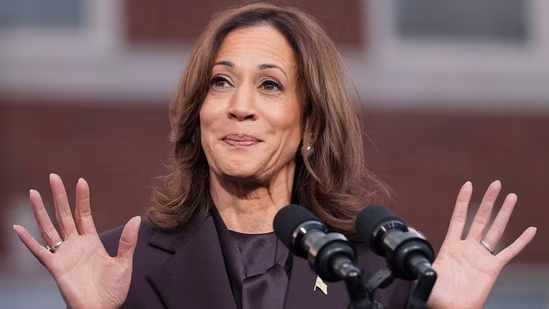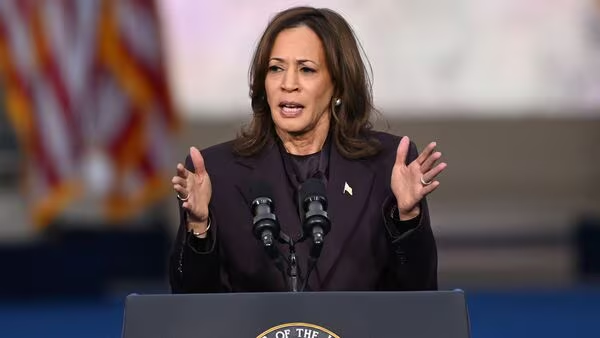Trump Pledges Support for Hindu Americans, Criticizes Kamala Harris’s Stance on India and Kashmir
As President-elect Donald Trump prepares to assume office, Trump’s recent comments, particularly his focus on the plight of Hindu minorities abroad, have prompted a stark contrast with the policies of Kamala Harris, the U.S. Vice President-elect. Shalabh Kumar, an influential industrialist and founder of the Republican Hindu Coalition, recently accused Harris of having policies that “oppose Indian interests,” despite her Hindu background and Indian heritage.
Kumar’s comments, which were made in an interview with ANI (Asian News International), raise significant questions about Kamala Harris position on India-related issues, especially Kashmir. According to Kumar, Kamala Harris campaign has been influenced by individuals with pro-Pakistan leanings, and her stance on Kashmir, in particular, poses a challenge to U.S.-India relations. Kamala Harris has voiced support for the “freedom of Kashmir,” a region that has been a point of contention between India and Pakistan for decades. This support, Kumar argues, undermines India’s sovereignty and interests.
Kamala Harris’s Policies on Kashmir and India

Kumar specifically criticized Harris for her position on Kashmir, which he described as “radical.” He argued that Kamala Harris support for a “free Kashmir” is not only contrary to India’s national interests but also reflects a lack of understanding of the broader geopolitical dynamics at play, including the growing partnership between China and Pakistan. The industrialist warned that such policies could lead to instability in the region, particularly given Pakistan’s alignment with China, which could be used as a proxy to challenge both India and the U.S.
While Kamala Harris heritage ties her to India, Kumar believes her actions and political views are disconnected from the values and interests of the Indian diaspora. “Kamala Harris is just Hindu by name, but her actions and policies are anti-India,” he said. Furthermore, he voiced concerns that certain individuals within Kamala Harris campaign have shown pro-Pakistan sympathies, which could adversely impact U.S.-India relations should she ascend to the presidency.
This critique of Kamala Harris stance on Kashmir is not the only issue Kumar raised. He also suggested that her focus on “so-called minority issues” could further strain diplomatic relations between India and the U.S. He specifically pointed to what he views as her disregard for the suffering of Hindus in countries like Bangladesh, Canada, and even the U.S. itself. In contrast to Harris’s positions, Kumar has expressed clear support for President Trump’s policies regarding Hindu Americans and his stance on protecting religious minorities.
Trump’s Commitment to Strengthening U.S.-India Relations
In contrast to Kamala Harris position, Donald Trump has been vocal about his commitment to strengthening ties with India. Just days before the 2024 U.S. presidential election, Trump reaffirmed his dedication to fostering a stronger partnership between the U.S. and India, highlighting his close relationship with Indian Prime Minister Narendra Modi. Trump has been consistent in his support for Indian Americans and the Hindu community, particularly as concerns about religious intolerance and violence against Hindus persist around the world.
During his campaign, Trump addressed the challenges faced by Hindu Americans, particularly with regard to the “anti-religion agenda” of the radical left. Trump’s rhetoric centered on protecting Hindu Americans from discrimination and violence, positioning himself as a staunch advocate for religious freedom and individual rights. “We will also protect Hindu Americans against the anti-religion agenda of the radical left. We will fight for your freedom,” Trump stated.
Additionally, Trump expressed concern over the violence that Hindu and Christian minorities face in countries like Bangladesh. Reports of religious persecution, including mob attacks and property destruction, have sparked international condemnation. Trump has been particularly vocal on this issue, condemning the “barbaric violence” against Hindus, Christians, and other minorities in Bangladesh. He condemned the violence as “a total state of chaos” and made it clear that his administration would take a stand against such injustices.
India-Pakistan Relations and the Role of U.S. Leadership

Shalabh Kumar’s comments reflect broader concerns within the Indian-American community regarding U.S. policy on South Asia. In particular, the relationship between the U.S., India, and Pakistan remains one of the most complex and contentious issues in international diplomacy. Trump’s stance on Pakistan, particularly his criticism of Pakistan’s ties with China and its support for terrorism, has been welcomed by many in India. In contrast, Harris’s policies, as interpreted by Kumar, could lead to a shift in U.S. priorities that would benefit Pakistan at India’s expense.
For instance, the ongoing Kashmir dispute, which has been the source of conflict between India and Pakistan for decades, remains a sensitive issue in Indian-American communities. While India views Kashmir as an integral part of its territory, Pakistan claims it as a disputed region, and the international community remains divided on the matter. Harris’s support for a “free Kashmir,” as alleged by Kumar, could be seen as an endorsement of Pakistan’s position, which would complicate the diplomatic relations between India and the U.S.
The Future of U.S.-India Relations Under Trump

Despite criticisms from figures like Shalabh Kumar, Trump’s vision for U.S.-India relations remains one of cooperation and mutual benefit. Trump has emphasized the importance of a Free Trade Agreement (FTA) between the two countries, recognizing India’s potential as a global economic power. He has often referred to his good friendship with Prime Minister Modi and has stated that the next four years will see increased collaboration between the U.S. and India.
Kumar believes that Trump’s administration will usher in a period of economic growth and enhanced diplomatic ties between the two nations. With Trump in office, he expects stronger economic partnerships, especially in areas like trade, technology, and defense. Additionally, Trump’s commitment to protecting religious freedoms, including the rights of Hindu minorities, aligns with the values many Indian-Americans hold dear.
Conclusion: A Divided Stance on India and Religious Freedom
As the 2024 U.S. election approaches, the divide between the political priorities of Donald Trump and Kamala Harris regarding India and religious freedom remains a hot-button issue. Trump’s unwavering support for Hindu Americans, his clear stance on India’s sovereignty, and his condemnation of violence against Hindus have earned him the backing of many in the Indian-American community. In contrast, Kamala Harris’s policies, particularly her position on Kashmir, continue to draw criticism from figures like Shalabh Kumar, who argue that her approach to South Asian geopolitics could undermine U.S.-India relations.
The coming years will likely see these differences play out in U.S. foreign policy, with implications for both the U.S.-India relationship and the future of Hindu Americans. For now, Indian-Americans appear to be divided in their support, with many looking to the next U.S. administration for assurances on religious freedom, diplomatic cooperation, and regional stability in South Asia.

